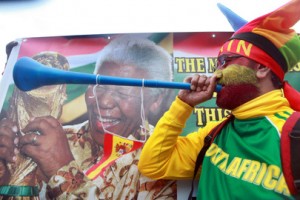South Africa victorious as World Cup host
 Toronto Star >> JOHANNESBURG — South Africa’s streets can be dangerously distracting for the news junkie. Everywhere, they’re lined with trees and poles bearing placards with head-turning headlines in bold print, such as this: “The Day We Earned Respect.”
Toronto Star >> JOHANNESBURG — South Africa’s streets can be dangerously distracting for the news junkie. Everywhere, they’re lined with trees and poles bearing placards with head-turning headlines in bold print, such as this: “The Day We Earned Respect.”
It celebrated national team Bafana Bafana’s unlikely tie last month with Mexico — ranked some 65 places ahead of South Africa. But it really sums up the swelling pride that South Africans feel in successfully hosting the World Cup, in defiance of apocalyptic warnings to the contrary.
Beyond the scoreboard, there has long lurked a sense that South Africa must prove itself capable of presiding over the biggest sporting event on the planet to a world that has been waiting for it to fail.
Distant pundits have lavished extravagant amounts of ink and airtime on forecasts of unmitigated doom. The stadiums would never be ready in time, writers warned. Well, they were.
Too few fans will attend, they said. In fact, they’ve come in droves: more than 97 per cent of available tickets have been sold, surpassing sales of the World Cup in Germany in 2006 and putting South Africa in line to match a World Cup record.
Still the panic ensued, ranging from crime concerns to a British tabloid’s prediction that the murder of white supremacist Eugene Terre’Blanche three months ago would lead to a “machete race war.”
The racial tensions that did bubble to the surface, due in part to the pronouncements of political firebrands like ANC Youth League leader Julius Malema, were marginal, short-lived and gained greater attention than any far-right splinter group or youth leader would normally merit.
While crime in South Africa is a serious problem, it’s fallen sharply since the World Cup began. Dedicated investigators, prosecutors and special courts have been set up throughout the country to catch, prosecute and sentence criminals with breathtaking speed. On a Wednesday last month, two armed men robbed three foreign journalists at gunpoint. Police arrested them on Thursday, and they had been tried, convicted and began serving 15-year sentences by Friday night.
The Institute for Security Studies is satisfied that officials are following due process and adhering to the constitution, and these “World Cup courts” could well become a permanent part of the judicial system.
All of this coincides with an under-reported, long-term trend: most violent crime in South Africa has been falling modestly but steadily for five years. Much of it occurs in destitute townships — it’s primarily the poor who will continue to suffer the effects of low-level crime and high-level lassitude, long after foreign soccer fans have flown home.
As the tournament draws to a close, scribes are proffering last-minute mea culpas and recanting previous proclamations of imminent woe.
World Cup local organizing committee CEO Danny Jordaan said critics from other countries have approached him to offer their congratulations — and apologies. “It’s very satisfying to us as a nation,” he said. “Affirmation is always good, affirmation of a country’s ability to deliver.”
In the run-up to the tournament many South Africans felt slighted by the widespread pessimism that hung like a wet blanket over Soccer City, as though the rugby and cricket world cups held here in years past had escaped everyone’s notice.
Now, wounded national pride is recovering. An email making the rounds since Bafana’s early exit recently rallied disheartened fans: “Choose another country to support, paint your face, fill the fan parks,” it implored. “Help a tourist, say hello to someone new. Fly the flags even higher and be proud of our country. This is our chance!”
As a foreigner, I felt that kind of hospitality and spontaneous warmth long before the World Cup began. I don’t recall ever feeling so at home as quickly or as consistently in any other country as I have here.
From the spectacular pre-cup concert in Soweto to dramatic world-class soccer, the month-long mega-event has been a surprising success. And it may help to build a reputation eroded by decades of racial oppression and rampant crime.
Being at the centre of the world’s attention provides advertising that money just can’t buy. With luck, investment and tourism will grow and help pay some of the big bills already popping through the letterbox.
Beyond the balance sheet, immense intangibles are within reach, including a growing spirit of camaraderie and ubuntu, which has been bubbling in the stadiums and beyond, and could well seep into the everyday lives of South Africans long after the last whistle has blown.
Of course, as World Cup euphoria cools, South Africans will return to the harsh realities of high unemployment and impoverished townships that lack the most basic services.
But if even a modicum of goodwill and sense of purpose survive amidst the defeatist discourse that so often infects Africa from outside, it would be the ultimate rebuttal.

